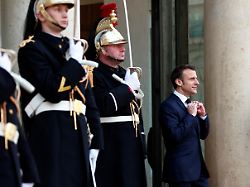Western troops in Ukraine?
France’s foreign minister specifies Macron’s proposal
February 27, 2024, 6:59 p.m
Listen to article
This audio version was artificially generated. More info | Send feedback
With his idea that Western states could send soldiers to Ukraine, French President Macron is triggering a diplomatic tremor. The contradiction comes quickly. Foreign Minister Séjourné also feels compelled to explain. A NATO country, however, expresses itself favorably.
France’s Foreign Minister has clarified controversial statements by President Emmanuel Macron about the deployment of Western troops in Ukraine. “We need to consider new measures to support Ukraine,” Stéphane Séjourné told parliamentarians. These would have to meet very specific needs: “I am thinking in particular of demining, cyber defense, the production of weapons on site, on Ukrainian territory. Some tasks could require a presence on Ukrainian territory without crossing the threshold into combat.” Nothing should be excluded. “The war can end at any time as soon as Russia decides to withdraw its soldiers from Ukraine.”
French President Emmanuel Macron had triggered a wave of rejection the evening before with his statement that sending Western ground troops to Ukraine could not be ruled out. At the end of a Ukraine conference in Paris, Macron himself admitted that there was no consensus on this issue. But he emphasized that he wanted to maintain a “strategic ambiguity”. Nothing should be ruled out that would contribute to Russia not winning the war in Ukraine.
Moscow immediately warned of the “inevitability” of a confrontation between NATO and Russia if alliance troops were deployed in the Ukraine war. Such a deployment is “absolutely not in the interests” of Western countries, said Kremlin spokesman Dmitry Peskov. Chancellor Olaf Scholz said that the rejection of a deployment was “very unanimous” among the participants at the Paris Ukraine conference. There will be “no soldiers on Ukrainian soil (…) who will be sent there by European states or NATO states,” he emphasized. Great Britain, Poland, Spain, the Czech Republic and Hungary also immediately rejected such considerations.
“No plans for NATO combat troops on site”
NATO Secretary General Stoltenberg said NATO allies are providing unprecedented support to Ukraine. This has been happening since 2014 and was intensified after the Russian invasion. “But there are no plans for NATO combat troops on the ground in Ukraine.” Slovak Prime Minister Robert Fico said his government had no plans to propose such an operation. However, some countries were weighing whether to enter into bilateral agreements to provide troops to help Ukraine repel the Russian invasion. Fico did not provide details about which countries were considering such agreements or what troops in Ukraine would do. Macron also avoided naming possible countries. He said he wanted to maintain strategic ambiguity and not forewarn Russia.
Sending troops has so far been taboo, especially since NATO wants to avoid being drawn into a larger war with nuclear-armed Russia. However, nothing prevents NATO members from participating individually or in groups in such an undertaking. NATO as an organization can only get involved if all 31 members agree.
The alliance provides Ukraine only with non-lethal aid and support such as medical supplies, uniforms and winter equipment. Some members send weapons and ammunition on their own initiative, bilaterally or in groups. A decision on the deployment of troops and their long-term stationing would require transport and logistics capacities that only states such as the USA, Great Britain, France, Germany and possibly Italy, Poland and Spain could provide.
Although Stoltenberg ruled out military intervention by NATO, he said that it was a war of aggression by Russia against Ukraine that blatantly violated international law. “Under international law, Ukraine of course has the right to self-defense, and we have the right to support it in upholding this right.”
Lithuania can imagine deployment
Lithuania, on the other hand, declared that it was not fundamentally opposed to the idea of deploying Western ground troops. Defense Minister Arvydas Anusauskas did not rule out the possibility that the Baltic EU and NATO country could send soldiers to the country attacked by Russia. At the same time, he emphasized that this was only possible for training purposes and not for participation in combat operations.
An adviser to President Gitanas Nauseda also said about a possible training mission for Lithuanian soldiers in Ukraine: “We talk about this possibility and do so openly. There are many nuances about what could happen and under what conditions.” Supporting Ukraine with weapons and ammunition remains the main priority for now, he said, according to a report by the BNS agency.
